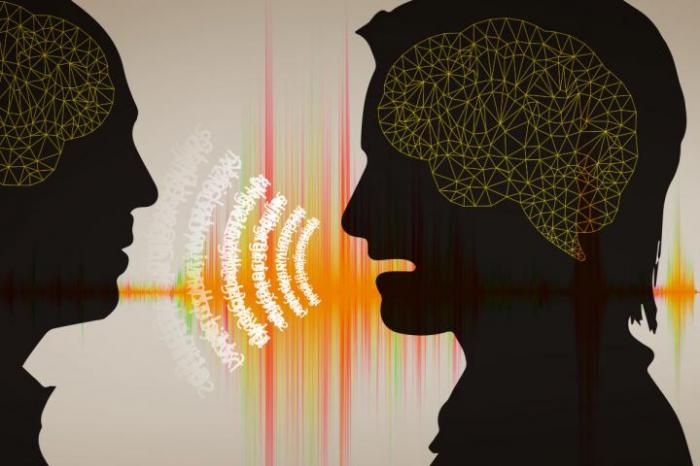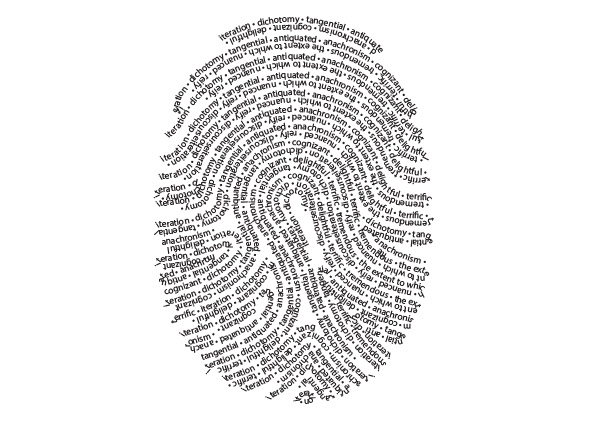Refining Coaching Linguistics: Verbal Tics, Placeholders and Fingerprint Words

In a recent New York Times article, writer Gregg Easterbrook shared this observation of modern day speech. "The verbal tic of saying “real quick” is surging ahead of “you know” in the American lexicon. “You know” is an empty expression, a verbal placeholder. By contrast, “real quick” has significance, reflecting the continuing acceleration of life. “Good morning, I would like to order an espresso please” now is “real quick can I get an espresso?” People who once said “perhaps we should meet in the conference room to review the project” say “real quick what’s up with the project?” Insertion of “real quick” assures the interlocutor (a person who takes part in a dialogue or conversation) that the pain of actually listening to someone soon will be over, and multitasking can resume."
I was first shocked into awareness of my favorite placeholder when, as a late teenager, a very astute young woman on the phone with me said “Oh my God! You just said seventeen “you know’s”! It was an embarrassing encounter with a verbal habit I hadn’t even been aware of. As I studied psychology and counseling, tape recordings and videotapes revealed other linguistic repetitions of mine so I could work on jettisoning my reflexive verbal placeholders from my work.
Listening to hundreds of recordings of wellness coaches in action, I’m often reminding Real Balance students to catch their own verbal tics. Saying “Okay”, or some equivalent, quickly after one’s client speaks is often a way to let the client know that we are tracking with them. When psychologist Allen Ivey taught “Micro-Counseling” skills he referred to such words, as well as head nods and “mmhh hmm’s”, as “minimal encourages”. Such responses by the counselor or coach encourage the client to go on. The trouble is…they often do!
 The downside of the “Okay” type response, especially when it is reflexive, is that it is a very quick signal to the client to keep on talking. The result with the overly talkative client is like a quick squirt of gasoline on an already hot fire. The client continues to hold the floor, often rambles, and the coach has an extremely hard time saying anything. The conversation is no longer a conversation, but a monologue. The client uses their own “placeholders”, saying “you know”, drawing out words, and speaking in ways that keep the “talking stick” in their own hand. Respectful interruption is needed, but even that may be hard to do after we have already primed the client to keep talking with our “Okay’s”.
The downside of the “Okay” type response, especially when it is reflexive, is that it is a very quick signal to the client to keep on talking. The result with the overly talkative client is like a quick squirt of gasoline on an already hot fire. The client continues to hold the floor, often rambles, and the coach has an extremely hard time saying anything. The conversation is no longer a conversation, but a monologue. The client uses their own “placeholders”, saying “you know”, drawing out words, and speaking in ways that keep the “talking stick” in their own hand. Respectful interruption is needed, but even that may be hard to do after we have already primed the client to keep talking with our “Okay’s”.
Listening to recordings of themselves coaching also helps coaches discover their own“fingerprint words”.

A coach may discover that they have pet words that they use over and over again. Often these words are a bit esoteric and can confuse the client if they are not part of that person’s common usage. Again, we do this without even being aware of it. The fingerprints may have a healthcare flavor, or be the trending words of current business-speak. Leveraging, optimize, or cognizant and the like, are words that, when used habitually not only become like identifying fingerprints of ours, they sometimes are unintended turn-offs to our clients.
On the other hand identifying the fingerprint words of our clients can be very helpful. While the intent of fingerprint words, especially ones that seem to reflect higher levels of education, may be to distinguish one’s self from the common folk, they can also have less snobbish meaning. A very powerful coaching technique is to identify such fingerprint words and when we see them used in a context that reflects emotional and/or strategic importance to our client, and then to feed this back to our client for them to consider. “Are you aware that each time you speak about taking time for self-care in any way you use the word indulgent?”
Our loquacious client’s vocabulary may be abundant, but quite natural for them. Even with Ph.D. behind my name and high scores on vocabulary tests, this American-educated soul was quite humbled reading The London Times in depth (dictionary at hand). Fingerprint words aren’t just unfamiliar words, but ones the client uses often, ones that leave their own “fingerprint” on a conversation. So it’s not usually the “twenty-five cent” words one uses, but more the ones we wear in our conversation like a tattoo on our forehead.
We sometimes pick up fingerprint words when we read or hear them in use and in some way identify with the author or speaker, or the context they are used in. We want to be like them and we start using the same key words, often without even realizing it.
When coaching and we encounter someone whose speech is different than ours, we are faced with a somewhat delicate situation. Sociolinguistics professor Diana Boxer says that in such situations we usually respond in one of two ways. “We either start to mimic them in some way, or distinguish ourselves from their usage.” We want to be careful not to send a message that we are being condescending, or patronizing. We need to ask ourselves how natural it feels to speak in ways that are more similar to our client. In coaching we want to always convey that our relationship is one of allies. Clients realize that there may be differences in speech and expression and don’t expect or even want us to alter who we are in order to communicate with them.
There is more to the ICF Core Coaching Competency of Communicating Effectively (http://coachfederation.org/credential/landing.cfm?ItemNumber=2206) than we often think. Coaches who are developing real proficiency in their work are scholars of language and communication. We study it because we know its power.








Only registered and logged in readers can leave comments.